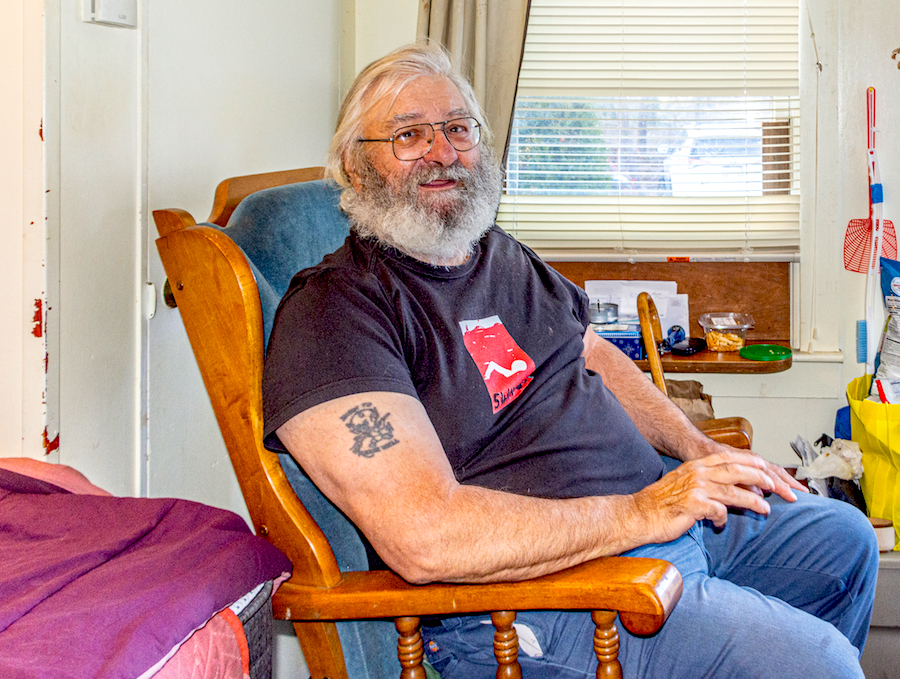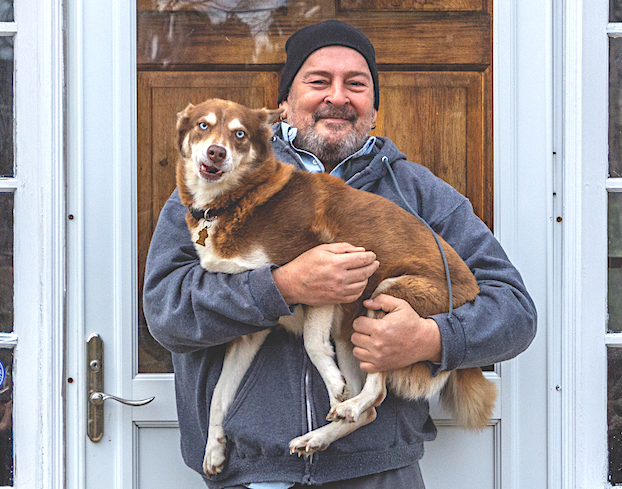TRURO — Dana Del Gizzi said he’s been in the construction business since the age of 12.
“We worked incredibly hard,” he said. “Most kids looked forward to the weekend — I looked forward to Monday.”
Dana, who lives in California, is part of a family well known for its nearly 100 units of rundown but affordable dwellings on the Outer Cape. They own buildings from Provincetown to Orleans, most of them rented year-round, providing a vital source of housing for hardworking immigrants, children, and the disabled.
But the Del Gizzis also owe years of back taxes, and routinely violate town regulations and health and safety codes at their properties. Town officials have been grappling with how to get compliance while protecting vulnerable tenants from homelessness.
In Truro, where the Del Gizzis own the most property — about 60 units in eight different locales — town officials have begun the process of taking the properties for nonpayment of taxes.
The family owes Truro $268,138 for taxes on seven properties due since 2011 or 2012, said Emily Beebe, town health agent.
Tax payments are up to date on the 36-unit Truro Motor Inn, because it’s got an inn license that’s contingent on annual tax payments. But after years of noncompliance — failing to upgrade the septic system and other code violations — the town is going to court next week to ask a judge to place the property in the care of a receiver, who would then collect the rent from the occupied units and make necessary repairs without, it is hoped, evicting anyone.
Though it’s nominally an inn, the Truro Motor Inn’s rooms have all been occupied by one or more tenants year-round for years. Over a dozen tenants left recently, after news that the court may take control of the property. Currently, only about two families, including four or five school-age children, remain, as well as a handful of individuals, said Maggie Flanagan, program director of the Homeless Prevention Council, which has guided several tenants to other housing.
In Eastham, the Del Gizzis own 10 properties. Last year, after 24 months of legal work, Eastham took possession of two properties, at 2835 and 2815 Route 6. By law, however, the Del Gizzis have a year to pay off $33,000 in back taxes before the taking is final.
They had owed taxes as far back as 2014 on most of their other properties, but recently much of that debt has been paid off, to the tune of $130,000, said Town Administrator Jacqueline Beebe.
341 Bradford’s Heat Is On
In Provincetown the only house the family owns, at 341 Bradford St., had no heat in parts of the five-unit building, said Morgan Clark, the town’s director of health and environment. Until recently, the family owed $184,582 in taxes from as far back as 2011.
This fall, Dana Del Gizzi took possession of the property from his elderly father, Daniel. He paid the 2019 and 2020 taxes right before the holidays, said Acting Town Manager David Gardner. Dana told the Independent he is getting ready to pay more of the debt this month, though he was not pleased with the 16-percent interest rate.
Dana behaves differently than his father and brother David, Clark said. He returns calls, and addresses complaints quickly. And in contrast to his dad and brother, Dana also took calls from the Independent.
Dana would not say why the family doesn’t pay taxes and ignores town regulations. He said he is only in control of two properties. He would not disclose what the second one is.
“I’m not going to comment on what is not in my control,” Dana said. “But anything I’m in control of, I pay my taxes and I pay my bills.”
Clark confirmed that Dana has already updated the heat at 341 Bradford St. and is working actively to correct other, more minor, issues.
Although Dana would not explain the reasons for the family’s current predicament, he did describe how his father, Daniel, began his Cape real estate acquisitions in 1959 with the Mayflower, an eight-unit rooming house that was once a converted barn housing lumber from a shipwreck. His family was in the house-moving business, and the Mayflower came from what is now the Highland Links golf course in Truro. The Mayflower became the Truro Motor Inn.
“We moved a lot of buildings,” Dana said.
Many of their current properties are collections of cottages and larger buildings moved from the Cape Cod National Seashore.
Daniel Del Gizzi bought the Lobster Shanty, a restaurant in Eastham, and then David bought the Orleans Lobster Pound. Dana said his father owns property off Cape as well.
“I’m not involved with my brother or my father in that way anymore,” he said. “All I have is the Provincetown property, and I’m working to clean that mess up.”
Tenants of the Del Gizzi properties expressed gratitude that they had a place to live, but “a mess” is just how some have described their homes. These tenants asked to remain anonymous for fear of retribution from David and his wife, Carolyn.
Many stated that they are there only because there is no other choice, and that the landlords exploit their vulnerability.
“He’s the only one who rents to us, and we can’t live in the cold,” said one tenant.
“That’s why they are squeezing us — they know we have no choice,” said a friend of that tenant.
After the town passed out notices of a possible eviction at the Truro Motor Inn this fall related to septic and code violations, the tenants began to demand answers. Carolyn Del Gizzi finally told one person that the septic system plans were in place, but that the town refused to sign the documents to get the work completed. The resident did not believe her, citing the news stories about the family’s multi-year history of ignoring town regulations.
“Come on,” the tenant said. “I was not born yesterday.”
A woman who moved to the Truro Motor Inn in August said she left after three weeks, because getting a hotel room was a better alternative than staying at the inn another night.
The first day she arrived, she said, she found the mattresses in her place soaked with urine. When she complained, David Del Gizzi apologized and blamed the former tenant. Other than that, he didn’t do anything, she said.
“I cleaned it, and I hired a professional to clean it,” she said.
Others described mold on the walls and tenants who smoked in their rooms, polluting the air for other tenants.
But, as one tenant said, it was better than being homeless, and she doesn’t want to make any of her friends who live there feel ashamed.
“I had no other place to go, so I know what that feels like,” she said.

Genevieve Nesbeth
A 55-year-old Jamaican native, Nesbeth moved into another Del Gizzi property in Truro, 101 Shore Road, on March 29, 2019. She had lived farther south in Truro, but moved because she doesn’t drive, and the North Truro compound of 13 one- and two-room units were closer to her work. She is a housecleaner at the Red Inn in Provincetown, often rising in summer at 4 a.m. and returning home at 10 p.m.
Because bus service in Truro wasn’t reliable at her old home, she had to pay for a cab.
She said her current place is small and costs $1,100 a month.
“I wish I had more room,” she said.
She is from Kingston, Jamaica, where she has a lovely place to live. But there is no work.
“When we come here, people think we come from nothing,” she said. And that’s not true, she added: most Jamaicans are educated, cultured, and hardworking. Most of the kitchens in Provincetown restaurants are run by Jamaicans.
Nesbeth said she left Jamaica in 2012 to earn more for herself and her daughter, who is now 19.
“I haven’t seen her eight years,” Nesbeth said. “Sometimes I walk and I cry, and I pray a lot to God.”
Her friend Lincoln McGregor is also from Jamaica and was staying with her temporarily, because his cottage at the Prince of Whales across the street isn’t heated. The Prince of Whales is owned by Fred E. Sateriale III. Del Gizzi’s units do include heat.
McGregor and Nesbeth have legitimate working papers, and both pay taxes in the U.S., they said.
The Outer Cape relies on the labor provided by Jamaicans, McGregor said, and this works well for all, with one glaring exception.
“All we need is a place to live,” McGregor said. “That’s all we ask.”
Manuel ‘Rip’ Gaspa

At age 72, Gaspa has a bad knee and collects Social Security and a retirement pension that cover his expenses for three out of four weeks in a month, he said.
He moved into 101 Shore Road nine years ago, while waiting to get into Maushope, the Provincetown Housing Authority’s complex for elderly residents. He’s been on the waiting list for eight years.
Born and raised in Truro, Gaspa drove trucks for local business owners like Donald “Ducky” Noons. He can no longer drive due to health problems.
Gaspa said he is offended by the Truro Board of Health and other officials who want the Del Gizzis to upgrade their properties to meet health, building, and safety standards.
“What happens is, people come from away and they get these town jobs, and they want to make it look like the place they came from,” he said.
The reality is that many people need places like 101 Shore Road and the Truro Motor Inn because there isn’t anything else, he said. In the 13 units at 101 Shore Road, one resident has Alzheimer’s and is currently in a nursing home, another has cancer, and besides him, three others are disabled, he said.
“It ain’t the Waldorf, but we have a roof over our heads,” Gaspa said.
Miguel Pettinelli

Pettinelli, who has lived at the Truro Motor Inn since March, said the 36-unit inn has gone from totally full to a “ghost town” following news of the Truro Board of Health’s intention to put the inn in the hands of a court-appointed receiver who will renovate the property.
Pettinelli, who lives with his service dog to help him cope with epilepsy, has a two-room unit that is too small even for one man.
“It isn’t right — it’s too small,” he said. “It’s not even fair for my dog.”
His unit looks out over a parking lot now filled with abandoned cars, which gives the mistaken impression that the place is still full, he said.
Pettinelli came to the Outer Cape from Falmouth with the promise of a job working a shellfish grant. That job did not pan out, and there are not many careers that allow him to bring a dog along. He has struggled to find work, he said.
His rent of $1,100 with heat is all he can afford.
Moving to Truro “was a bad move for me,” he said.
The press attention on the Truro Motor Inn has been painful, because it adds shame to an already difficult position.
“It’s harsh to have everyone tell you what a bad move I made,” he said. “Yes, it’s too small for human habitation. Thanks for pointing that out.”
Now that the town has begun the process to put the building in receivership, there is much insecurity. It doesn’t feel stable, which is why so many people have left, he said.
“My plan is to get out,” he said.



